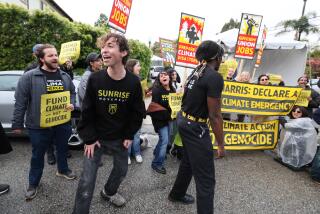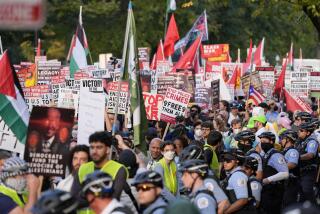He Was Born to Protest, but He Will Sit This One Out
If the police used profiles to predict who is most likely to protest the Democratic National Convention (and who knows, maybe they do), I would probably be a perfect fit.
Besides being youngish, bearded, left-of-center, an academic, single and socially connected to many who are demonstrating at the event, I have a family history of political activism.
My grandparents were blacklisted in New York during the McCarthy era for their involvement in the labor movement, and my father and mother were two of the founders of Students for a Democratic Society. In fact, because of my folks’ involvement in SDS, I am myself literally a footnote in the history of the notorious Chicago convention of ‘68: At least two memoirs of that event relate the story of my mother wheeling me in a baby carriage through the chaos of Grant Park, daring the cops to “tear-gas my baby!” (Thanks, Mom.)
While I am now 32 years old and a bit too large for a baby carriage, this is not the main reason I have not been at the demonstrations at the Staples Center. Am I too busy? Well, yes and no. I recently moved to the L.A. area to begin my new job as a professor of sociology at Cal State Long Beach, so I do have quite a bit to do to prepare for the coming semester. Still, like some other professors who have been seen among the protesters, I could probably justify going in the name of research or in the interest of gathering material for teaching my courses.
Am I afraid? I’d be a liar if I said I wasn’t intimidated by the LAPD in full riot gear, or by the “anarchists” in bandannas who seem to be spoiling for a fight for fighting’s sake. But I’ve been arrested before, been punched in the head more than once and have survived mosh pits and other dense crowds of sweaty people.
Am I apathetic? By the standards of my activist family, a little, but not by the standards of most Americans, since I’m actually watching the convention on TV.
On the other hand, protests and demonstrations are acts of dissent, statements of one’s disaffection with mainstream politics. And while they often entail profound unity among protesters, they sometimes, for that reason, can be interpreted as expressions of disunity with, and anger at, those who are not protesting. Call me complacent, but at this moment in the history of the country and my life, I do not feel a burning need to loudly proclaim my dissatisfaction with the government, the political process, corporations or even the Democrats. Strangely, given my background, I don’t feel much affinity with the D2KLA protesters, even though I share their passion for democracy, human rights, protecting the environment and equality. Maybe it’s the puppets.
Perhaps it’s the Democrats themselves who are to blame for my unwillingness to protest their convention. The creation of good jobs, support for young working families and the fostering of national unity are precisely the achievements the Dems are touting this week. President Clinton said on Monday night that he had been “waiting over 30 years” to see the hopes and dreams of the 1960s come true. It was the same hopes and dreams that propelled my mother--however ill-advisedly--to offer me as target practice to the Chicago police in ’68.
The realization of those dreams (even if only partial) is in my case a more effective deterrent to protest than are pepper spray, rubber bullets and batons. I guess you could say, then, that I’ve been waiting over 30 years too--almost my entire life--for the opportunity not to protest at the Democratic convention.
More to Read
Get the L.A. Times Politics newsletter
Deeply reported insights into legislation, politics and policy from Sacramento, Washington and beyond. In your inbox three times per week.
You may occasionally receive promotional content from the Los Angeles Times.










